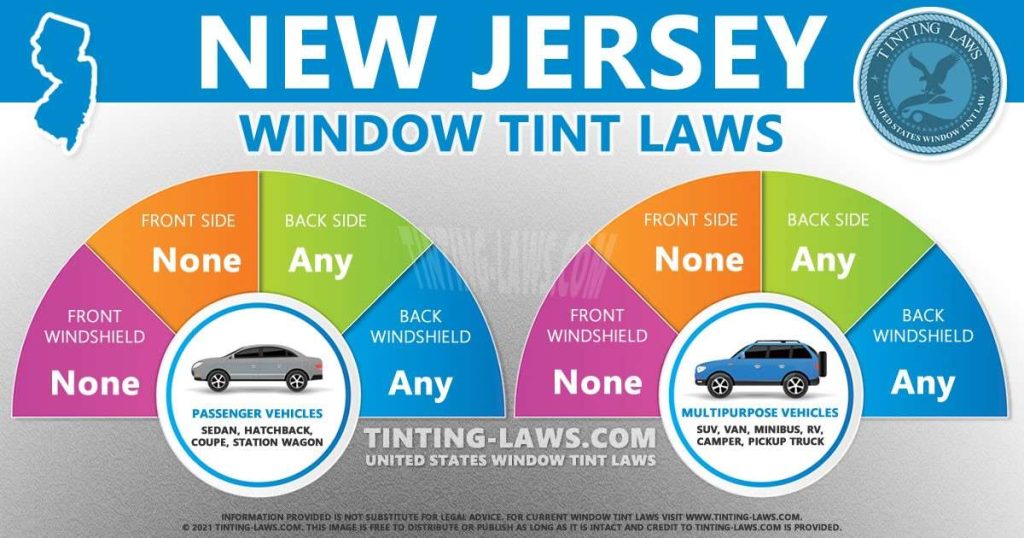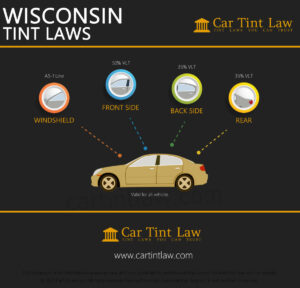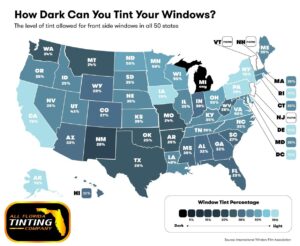As an Amazon Associate, I earn from qualifying purchases
Car tinting can enhance your vehicle’s look and provide privacy. But in New Jersey, there are specific laws you need to follow.
Understanding these laws is crucial to avoid fines and penalties. In New Jersey, car tint laws regulate the darkness and reflectiveness of window tints. These laws ensure safety and visibility for drivers. Whether you want to tint your car for style, privacy, or comfort, knowing the legal limits is essential.
This guide will help you understand NJ car tint laws, so you can make informed decisions. Learn what is allowed, what is not, and how to comply with the regulations. Stay informed and keep your car legally tinted in New Jersey.
Legal Tint Percentages
Understanding the legal tint percentages for car windows in New Jersey is crucial. It ensures your vehicle remains compliant with state laws. Failure to follow these laws can lead to fines. Moreover, it may result in the need to remove the tint. Below, we break down the allowed tint levels for different windows.
Allowed Tint Levels
In New Jersey, the front side windows must allow over 70% of light in. This means only a small amount of tint is allowed. The rear side windows can have any tint darkness. The same applies to the back window. These rules help ensure the driver has a clear view.
Variations For Different Windows
Different windows on your car have different tint requirements. Front side windows need to be less tinted. This helps in clear visibility. The rear side windows and the back window can be darker. This provides privacy for passengers. Make sure to follow these guidelines. It keeps your car legal and safe.

Credit: www.facebook.com
Medical Exemptions
Medical exemptions for car window tinting in New Jersey are essential for some drivers. These exemptions allow individuals with specific health conditions to tint their windows beyond the usual limits. Understanding the qualifying conditions and the application process is crucial.
Qualifying Conditions
Certain medical conditions may qualify for a window tint exemption. These conditions include, but are not limited to, photosensitivity, lupus, and skin cancer. Other conditions causing severe light sensitivity may also qualify. A doctor’s diagnosis is necessary for the exemption.
Application Process
To apply for a medical exemption, start by obtaining a certified statement from your doctor. This statement must detail your condition and the need for special window tinting. Next, submit the doctor’s statement to the New Jersey Motor Vehicle Commission (MVC). Include a completed application form. The MVC will review your request.
If approved, you will receive a certificate or sticker. This must be displayed in your vehicle. Keep it readily available for law enforcement. Always follow the specific guidelines provided by the MVC to maintain compliance.
Penalties For Non-compliance
New Jersey has strict laws for car window tinting. Understanding the penalties for non-compliance is crucial. Ignoring these regulations can lead to severe consequences. Let’s delve into the specifics.
Fines And Penalties
Violating NJ car tint laws can lead to hefty fines. The fines vary based on the severity of the offense. Here’s a breakdown:
| Offense | Fine |
|---|---|
| First Offense | $100 – $200 |
| Second Offense | $200 – $500 |
| Third Offense | $500 – $1000 |
Repeat offenders face higher fines. This can become a financial burden.
Impact On Insurance
Non-compliance with tint laws can affect your car insurance. Insurance companies may see you as a high-risk driver. This can lead to higher premiums. Here’s how:
- Insurance rates may increase.
- Claims could be denied.
- Policies might be canceled.
It’s essential to follow the laws. It helps avoid these negative impacts.
How To Measure Tint
Understanding how to measure tint is crucial for car owners in New Jersey. This ensures you comply with the state’s tint laws. Accurate measurement can prevent fines and legal issues. This guide will walk you through the process.
Tools Required
You need a few tools to measure car tint accurately. These include a tint meter, a clean cloth, and a flashlight. A tint meter is a small device that measures light transmission. You can purchase it online or from auto parts stores. A clean cloth is needed to wipe the window. This ensures no dirt affects the reading. A flashlight helps you see clearly if you measure tint at night.
Step-by-step Guide
First, clean the car window with a cloth. This removes any dust or dirt. Next, turn on the tint meter and set it to zero. Place the tint meter on the car window. Ensure it is flat and has no gaps. The meter will display a number. This number is the percentage of light that passes through the tint. Compare this number with the legal limit in New Jersey. For the front side windows, the limit is 70%. For the back and rear windows, there is no limit. If your reading is below the legal limit, you need to remove or replace the tint.
If you measure at night, use a flashlight. Shine it on the window to get an accurate reading. Always double-check your readings to ensure accuracy. Measuring tint is simple with the right tools and steps. Stay compliant with NJ laws and keep your car within legal limits.
Choosing The Right Tint
Selecting the perfect car tint requires knowledge of different types and factors. Understanding these elements helps ensure compliance with NJ Car Tint Laws while achieving your desired look and functionality.
Types Of Tint
There are various types of tints available. Each type offers unique benefits and drawbacks:
- Dyed Tint: This tint is the most affordable. It provides a dark appearance but may fade over time.
- Metalized Tint: It is durable and effective at blocking heat. However, it can interfere with electronic signals.
- Carbon Tint: This tint does not fade. It also offers excellent heat and UV protection.
- Ceramic Tint: The top choice for performance. It blocks heat and UV rays without interfering with electronics.
Factors To Consider
When choosing the right tint, consider the following factors:
- Legal Limits: Ensure your tint complies with NJ Car Tint Laws. Check the allowed Visible Light Transmission (VLT) percentage.
- Purpose: Determine why you need the tint. Is it for privacy, UV protection, or heat reduction?
- Budget: Different types of tints come at various prices. Choose one that fits your budget.
- Durability: Consider the tint’s lifespan. Some tints are more durable than others.
- Appearance: Choose a tint that enhances your car’s look. Consider how dark or reflective you want the tint to be.
| Type of Tint | Benefits | Drawbacks |
|---|---|---|
| Dyed Tint | Affordable, Dark Appearance | May Fade Over Time |
| Metalized Tint | Durable, Blocks Heat | Interferes with Electronics |
| Carbon Tint | Does Not Fade, UV Protection | Higher Cost |
| Ceramic Tint | Top Performance, No Interference | Most Expensive |
Informed choices help you select the ideal tint. This ensures compliance and satisfaction with your car’s new look.

Credit: www.tinting-laws.com
Professional Tinting Vs. Diy
Tinting your car windows can improve privacy and reduce glare. You have two choices: professional tinting or doing it yourself (DIY). Both options come with their own set of advantages and disadvantages. This section explores professional tinting vs. DIY tinting.
Pros And Cons
Professional tinting ensures a perfect finish. Experts use high-quality materials. They know the laws and regulations. This helps you avoid legal issues. On the downside, professional services can be expensive.
DIY tinting is cheaper. You have the satisfaction of doing it yourself. But it comes with risks. Mistakes can lead to bubbles and a poor finish. You might not know the legal limits for tint darkness. This could result in fines.
Cost Comparison
Professional tinting can cost between $100 and $400. The price depends on the car type and tint quality. Some high-end tints can cost more.
DIY tinting kits are cheaper. They usually cost between $20 and $100. But remember, quality matters. Cheaper kits may not last long. You might need to redo the tint sooner.
Maintaining Your Tint
Maintaining your car tint is essential to ensure that it lasts longer and performs well. Proper maintenance helps avoid issues like bubbling, peeling, and discoloration. It also ensures that your car stays within the legal limits set by NJ car tint laws.
Cleaning Tips
Cleaning your tinted windows correctly is crucial. Use a mild, ammonia-free cleaner. Ammonia can damage the tint film. Mix a gentle soap with water for the best results. Avoid using abrasive materials like rough sponges or paper towels, which can scratch the tint. Instead, use a soft microfiber cloth. Wipe the windows gently to remove dirt and grime.
Follow these steps for a thorough clean:
- Spray the cleaner onto the cloth, not directly on the window.
- Wipe the window in a circular motion.
- Dry the window with a clean microfiber cloth.
Longevity And Durability
To ensure your tint lasts, park your car in shaded areas. Sun exposure can degrade the tint film over time. Extreme temperatures also affect the tint. Use a sunshade to protect the interior when parked outside.
Regular inspections can help spot problems early. Look for signs of peeling, bubbling, or discoloration. Address these issues promptly to prevent further damage. Professional installation ensures durability and adherence to NJ car tint laws.
Consider these tips for extending the life of your tint:
- Avoid rolling down windows for a few days after installation.
- Do not use sharp objects near the windows.
- Check the tint regularly for any damage.

Credit: www.vinylfrog.com
Frequently Asked Questions
What Is The Legal Tint Limit In NJ?
In New Jersey, the front side windows must allow more than 70% of light in. There are no restrictions on the rear side and back windows.
Are Tinted Windows Legal In New Jersey?
Yes, tinted windows are legal in New Jersey, but they must comply with specific light transmission requirements.
Can You Tint Your Windshield In NJ?
In New Jersey, only the top 6 inches of the windshield can be tinted. The rest must remain clear.
What Are The Penalties For Illegal Tint In NJ?
Penalties for illegal window tint in New Jersey can include fines and mandatory removal of the tint.
Conclusion
Understanding NJ car tint laws helps you stay compliant and avoid fines. Always check local regulations before tinting your vehicle. Proper knowledge ensures safety and adherence to the law. Stay informed and enjoy a hassle-free driving experience. Remember, legal tinting enhances both aesthetics and protection.
Keep your car stylish and within the law. Thanks for reading, and drive safely!
As an Amazon Associate, I earn from qualifying purchases


